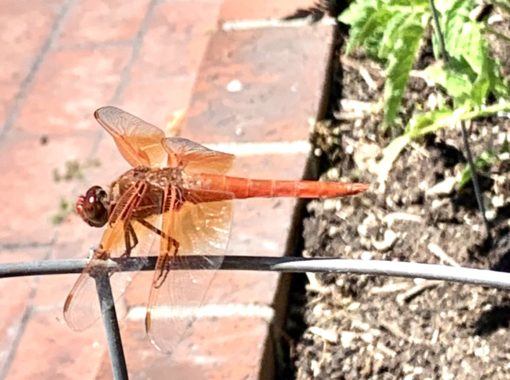
Dragonfly. Photo: Evaggelos Vallianatos.
Some friends were wondering how I spend my days. I told them I write most of the time. I explained my books and essays are invisible conversations, if not with the present, at least with the future. I keep asking questions about life, all of its gigantic spectrum: biological, social, political and historical.
I published my first academic article in 1969. I was then a graduate student at the University of Wisconsin writing my dissertation about a Greek intellectual, Adamantios Koraes, and the Greek Revolution.
I am still writing Greek history and tell stories that mirror my anxieties about our times: neither classical nor paradigmatic of civilization.
The magic of music
Yet each time I start typing, I am listening to traditional Greek music or classical music. The sounds and the lyrics of Greek songs have such an uplifting on my mind and being, I see the world always in a new light. I start singing and, sometimes, if the tunes are really familiar, I get up and dance.
Classical music, in contrast, has a soothing and pleasant effect. I must have listened to Ludwig van Beethoven’s symphonies hundreds of times. Arcangelo Corelli is perfection. Yet, I wonder, why these “classical” musicians wrote such beautiful music. Some of them lived during tyrannies. Where did they find inspiration?
These questions don’t arise while listening to traditional Greek music, which has roots to the ancient but powerful musical celebration of Dionysos, medieval ecclesiastical liturgies, and peasant singing at harvest times and weddings. These sounds envelop me, lift me to heavens, and protect me from the cacophony and plagues of the twenty-first century.
The delights of the natural world
The natural world protects me, too. In my case, it is the little parcel of land surrounding my home, the territory that is very close to me. I have a few trees and flowers that never fail to delight me.
I have one pomegranate tree, one lemon tree, four orange trees, and two fig trees, and four tomato plants. I water them, touch their leaves, and look forward to smelling their blossoms and eating their sweet fruit.
In the portico behind my house, two doves made their nest in a corner of the roof. The table I put my computer for writing is about four meters away from the doves.
I admire the patience of the father and mother dove, sitting for days over the egg.
The doves kept looking at me hugging the computer and I them taking turns in hatching their precious egg, which they successfully did in the form of a beautiful young chick.
My other pleasure is seeing birds drinking water in the stone and ceramic bowls I have in the front and back of my house.
Facing reality
I have these birds in mind when I get angry with leaf blowers and those uncaring people paying them to cause temporary upheavals with horrific sounds and pollution for nothing but the satisfaction of sick ideas about cleanliness. To the birds, a leaf blower must be the equivalent of a bomb explosion.
Like the ever-present polluting cars, the useless but loud leaf blowers are destined to be another toxic gadget for people who are almost no longer civilized.
Leaf blowers are practically insignificant in a range of technologies harming humans and the natural world. They are simply symbolic of a society that no longer knows what is good and what is bad.
What is life?
It should be obvious that life is the apex of countless millennial of evolution and improvement. Humans and birds and dragonflies and monarch butterflies went through the test of time and of the environment. They are what they are because of their inexhaustible tenacity and love of life and of being alive.
History
Zeus was wrong to punish Prometheus for bringing the fire of knowledge to the Greeks and other humans. Humans, however, did not merit the trust and love of Prometheus. They misused knowledge.
After the Greek enlightenment, we have the dark ages, a series of continuous wars, the rapid increase of technical know-how, and the building of ever more powerful killing machines.
The current corona virus plague is a consequence of the wrong turn in human evolution since the Greeks. Will this destabilizing pandemic teach us to put our house in order?
That, for example, we can no longer continue with the deleterious and extinction technologies of nuclear weapons and fossil fuels. Neither can we continue cannibalizing billions of animals in barbarous concentrations camps.
State secrets
Thinking and writing about these unpleasant, nay horrific, realities is not easy. Having a handful of persons in the planet who can, literally, kill millions of people and blow apart some part of the planet, is a nightmare. Nevertheless, we are going out of our way in hiding this secret, while advertising ourselves as a superpower and exceptional people.
In addition, we go on living by systematically obscuring the life and death threats from burning petroleum, natural gas, and coal. Everything practically runs on fossil fuels. Petroleum-run cars were invented more than a century ago. Why are we still primarily addicted to this dangerous technology?
From my two years of working on Capitol Hill, and attending lots of hearings, I remember Democrat and Republican politicians justifying nuclear bombs behind the holy grail of national security.
The same shenanigans legitimized subsidies to the very corporations that brought us climate change and giant animal farms.
Monsters or life?
The corona virus plague has revealed the extreme vulnerabilities of being locked to obsolete assumptions on human nature and the nature of the natural world. The plague opened a hole to the wall of secrecy protecting our monsters: nuclear weapons, fossil fuels-climate change, and ill farms making people sick.
These monsters are the exact opposite of life: its beauty, sweet pleasures, passionate loves, and the exhilaration of being alive.
You cannot have both monsters and life.